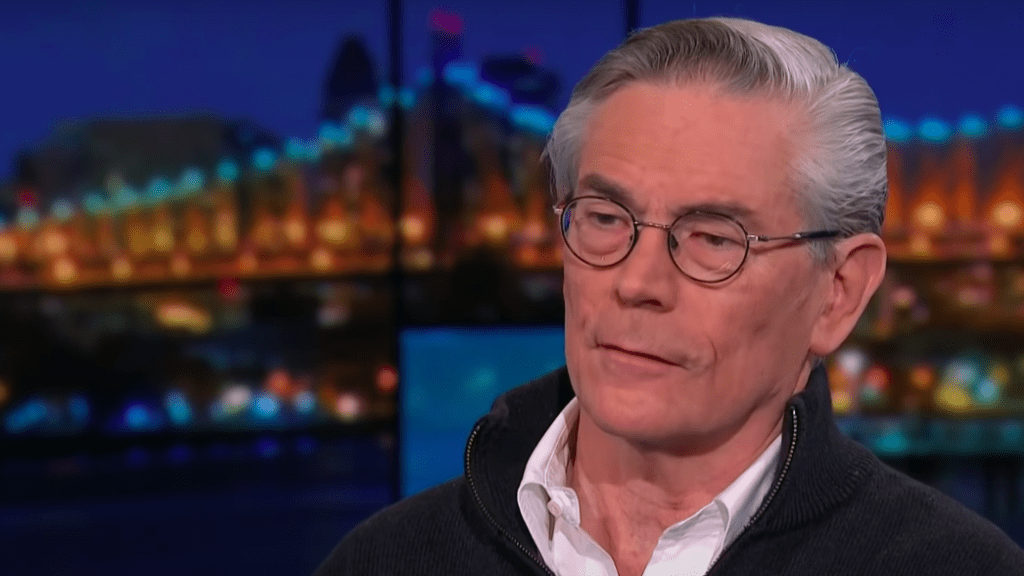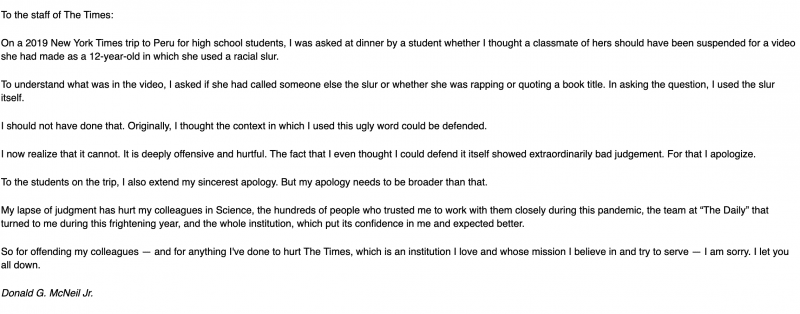Times Pushes Don McN-Word Out

This is one of the most shocking examples yet of cancel culture: The New York Times has parted ways with science correspondent Donald G. McNeil, Jr., over his use of the N-word on a student trip sponsored by the Times:

Nearly a half-century of work for the Times, gone. And on the way out, McNeil abased himself before his colleagues:

All this comes from a Daily Beast report that alleged:
After the excursion ended, according to multiple parents of students on the trip who spoke with The Daily Beast along with documents shared with the Times and reviewed by the Beast, many participants relayed a series of troubling accusations to the paper: McNeil repeatedly made racist and sexist remarks throughout the trip including, according to two complaints, using the “n-word.”
A photo from the trip showed that at least 26 students participated. Of that group, at least six students or their parents told the tour company that partnered with the Times that McNeil used racially insensitive or outright racist language while accompanying the participants on the trip, which according to the Times website typically costs nearly $5,500. Two students specifically alleged that the science reporter used the “n-word” and suggested he did not believe in the concept of white privilege; three other participants alleged that McNeil made racist comments and used stereotypes about Black teenagers.
McNeil conceded in his parting statement that he used the N-word, and explained the context. I think he’s wrong: I think that context is forgivable, if still poor judgment. If he doesn’t believe in the concept of white privilege, so what? One is not allowed to dissent from an ideological idea? As to using “stereotypes about Black teenagers,” what does that even mean?
From the Beast’s latest report:
McNeil’s behavior on the trip had been hotly debated among Times staffers, including some who took part in a meeting with executive editor Dean Baquet and assistant managing editor Carolyn Ryan last Friday. At that meeting, Pulitzer Prize-winner Nikole Hannah-Jones said she planned on calling the parents and students on the trip to determine what McNeil had said and in what context, according to people familiar with the situation.
Ah, so Nikole Hannah-Jones is now in the position of determining who does and does not get to stay at the paper. Useful to get that learned.
Remember Bari Weiss’s resignation letter? Remember this part?:
Twitter is not on the masthead of The New York Times. But Twitter has become its ultimate editor. As the ethics and mores of that platform have become those of the paper, the paper itself has increasingly become a kind of performance space. Stories are chosen and told in a way to satisfy the narrowest of audiences, rather than to allow a curious public to read about the world and then draw their own conclusions. I was always taught that journalists were charged with writing the first rough draft of history. Now, history itself is one more ephemeral thing molded to fit the needs of a predetermined narrative.
My own forays into Wrongthink have made me the subject of constant bullying by colleagues who disagree with my views. They have called me a Nazi and a racist; I have learned to brush off comments about how I’m “writing about the Jews again.” Several colleagues perceived to be friendly with me were badgered by coworkers. My work and my character are openly demeaned on company-wide Slack channels where masthead editors regularly weigh in. There, some coworkers insist I need to be rooted out if this company is to be a truly “inclusive” one, while others post ax emojis next to my name. Still other New York Times employees publicly smear me as a liar and a bigot on Twitter with no fear that harassing me will be met with appropriate action. They never are.
There are terms for all of this: unlawful discrimination, hostile work environment, and constructive discharge. I’m no legal expert. But I know that this is wrong.
I do not understand how you have allowed this kind of behavior to go on inside your company in full view of the paper’s entire staff and the public. And I certainly can’t square how you and other Times leaders have stood by while simultaneously praising me in private for my courage. Showing up for work as a centrist at an American newspaper should not require bravery.
If Weiss is telling the truth — and I believe her — then she was expected to put up with harassment like that from the Wokesters inside the Times, but they cut loose one of their most valuable and distinguished reporters for ill-advised (but not hatefully intended) comments made on a field trip. Who the hell would want to work at that paper? Nearly half a century of work for the Times, some of it award-winning, and being its lead reporter on one of the most important stories of the century, counted for nothing when the woke mob demanded his scalp.
Arendt said that in a pre-totalitarian society, loyalty is more important than expertise. Donald Trump famously prized loyalty from his subordinates above anything else, and said so at least once. But the Times, and institutions like it, now value loyalty to this harsh and unforgiving new ideology above expertise, and even above loyalty to the company itself.
You watch: the Times is okay for now, because it’s got a deep bench. But what happens when it starts driving other talented journalists out because they feel they can no longer work under conditions in which any little thing they might say could attract the attention of the mob, and Nikole Hannah-Jones gets to go to Dean Baquet’s office to threaten him about the journalist? If you don’t think things like this affect the kinds of stories that get proposed and written at the Times, you don’t know how newsrooms work. You might think that the impact of this will be for Times reporters in the future not to use the N-word on field trips with students. Well, yes, that is one result, and a good one. But the deeper fallout is that it reveals no one is safe from cancel culture at that newspaper, not even one of its most valuable reporter assets, not even a reporter who has loyally served there for decades, and not even if he apologizes for having said a word.
I am glad that none of my children want to follow their father’s footsteps into journalism. It is a rotten field, ruled by Jacobins, prisspots, overgrown children and zealots. Some of the most interesting journalists I’ve known in my career have been deeply flawed human beings. But they knew how to find a story, and they knew how to tell a story, and they had humanity. These are not commonly distributed gifts. If they failed in some minor way, there would be forgiveness for them, because people gave others grace then, especially if they were a valuable member of the team. There would be no place for men and women like this in what American journalism has become.
A friend asked the other day: why not start a magazine in which the most interesting writers — he mentioned Andrew Sullivan, Glenn Greenwald, Matt Taibbi, and Bari Weiss, but there are many others — who cannot work in contemporary newsrooms because they won’t kowtow to wokeness, write columns? Why not create a magazine, he said, that celebrates writers who are free-thinking, rough around the edges at times, but always interesting?
Good question. Greenwald, Taibbi, and Sullivan are all making a small fortune now on Substack, but if I were a billionaire, I would start that magazine, and screw the quivering mandarins of the journalism industry.
The Times sealed its fate when it committed itself to The 1619 Project — an ideological lie. Of course they’re going to send Donald McNeil packing when he offends Nikole Hannah-Jones and her newsroom mob, and given him no chance for redemption. McNeil won’t be the last one, either (I’m only sorry he didn’t go out with his head held high). This Twilight Zone episode surely captures what it’s like to work at the Times now:
UPDATE:
2/ "We do not tolerate racist language regardless of intent"
This suggests that "impact, not intent," an idea so morally broken and reactionary I've only associated it with 20-year-old Tumblr weirdos in the past, now holds sway at the New York Times.https://t.co/nCNbJ7aXAs
— Jesse Singal (@jessesingal) February 5, 2021
The NYT seems to have fired a man for stating the n-word in a non-derogatory context. This is a word that you can search the NYT archives for right now and find used frequently and recently. https://t.co/m7c8UPDpF7
— Katie Herzog (@kittypurrzog) February 5, 2021
So his intent was to help a student on a study abroad trip and he's getting fired from his job two years later because he, at 65, mistakenly thought the taboo was uttering the word as a slur–as it was for much of his life–rather than uttering it at all? https://t.co/owYa7FbEqh
— Conor Friedersdorf (@conor64) February 5, 2021
If you are an intelligent, curious, independent-thinking young person, think hard before choosing journalism as a career — or at least steer very clear of The New York Times. I wish I could say that the disease inside the Times was confined there, but it’s not. If it weren’t, the Washington Post or other top papers would be sending McNeil a contract right now.
UPDATE.2: Wes Yang understands the deeper meaning of this destructive totalitarian ideology:
One week ago, Dean Baquet thought intentions mattered
The ideological succession causes ideas at the foundation of our criminal justice system and moral psychology to evanesce upon contact with the first open letter alleging harm pic.twitter.com/JghUL3irGe
— Wesley Yang (@wesyang) February 6, 2021
And Claire Lehmann, editor in chief of Quillette, shows why she’s the right woman in the right job:
One week ago, Dean Baquet thought intentions mattered
The ideological succession causes ideas at the foundation of our criminal justice system and moral psychology to evanesce upon contact with the first open letter alleging harm pic.twitter.com/JghUL3irGe
— Wesley Yang (@wesyang) February 6, 2021